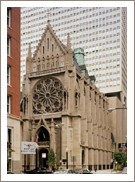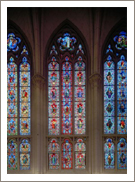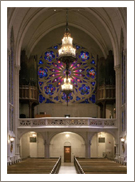Ceremony
Parking
There is no attached or reserved parking for St. James Chapel. There
is limited metered/street parking in the area.
We will have pre-paid tickets available to allow you to exit the
garage at 111 E. Chestnut
(entrance is on Pearson,
right next to the Chapel, and Bistro 110). They are good for 8 hours of
parking. Be sure to ask one of our ushers at the ceremony if you need
one.
You can use Chicago
Parking Map to find information about other garages close to the
ceremony location.
Accessibility
for Guests with Disabilities
The elevator is accessible from the driveway just north of the
entrance to the Quigley Pastoral Center. Guests may be dropped off and
picked up there, but there is no parking for vehicles in that area.
What to Expect
The wedding ceremony will be performed within a full Roman Catholic
Mass, lasting 45 minutes to one hour. Father Frank Phillips, the pastor
of Christina’s parish, St. John Cantius, will be the celebrant.
Why We Chose
This Location
The Chapel of Saint James is part of the building that was
originally constructed as a preparatory high school seminary for boys –
Quigley Memorial Seminary. Quigley had two campuses – North (which
housed the Chapel) and South. Ken is an alumnus of Quigley South, and
so our choice has great meaning for him. While Christina worked for
Loyola University Chicago across the street, she would tour the chapel
when its windows were being restored, and the building’s place in
Chicago’s history is important to both of us.
About the Chapel
 The Chapel of Saint James at the
Archbishop Quigley Pastoral Center is a beautiful French Gothic chapel. The Chapel of Saint James at the
Archbishop Quigley Pastoral Center is a beautiful French Gothic chapel.
The building was originally constructed as a preparatory high school
seminary for boys, the dream of Archbishop James E. Quigley.
Constructed after his death by Archbishop George Mundelein, the Quigley
Memorial Seminary was completed in 1919.
The Chapel of St. James, hidden away on the building’s second floor
is nearly identical to Sainte-Chappell in Paris. The first sacred Concert
was held in St. James Chapel on November 22, 1919, the feast of St.
Cecilia, patron saint of music.
 Inside St. James Chapel, the
windows dominate (take a tour of the windows here).
During the middle ages when few people were able to read, stained glass
windows told the stories of Christianity to the illiterate. In this old
tradition, St. James’ windows compose a narrative of the Bible and are
positioned as they would be in a medieval church. The rose window,
modeled after the rose window at Notre Dame in Paris is devoted to the
life of Mary. The windows, fabricated in Chicago with antique stained
glass from England, were completed in 1925. Inside St. James Chapel, the
windows dominate (take a tour of the windows here).
During the middle ages when few people were able to read, stained glass
windows told the stories of Christianity to the illiterate. In this old
tradition, St. James’ windows compose a narrative of the Bible and are
positioned as they would be in a medieval church. The rose window,
modeled after the rose window at Notre Dame in Paris is devoted to the
life of Mary. The windows, fabricated in Chicago with antique stained
glass from England, were completed in 1925.
 The magnificent rear altar and its
sculptures are of Caen limestone carved in France. The altar stands
fifty feet tall. The central figure is St. James the Greater, patron
saint of travelers and pilgrims. His symbols are a staff and lamp. To
his left and right stand six angels, each holding a symbol associated
with the crucifixion: a spear; cross; hammer and nails; pillar at which
Jesus was scourged; the Eucharist of the Last Supper; and a Crown of
Thorns. The magnificent rear altar and its
sculptures are of Caen limestone carved in France. The altar stands
fifty feet tall. The central figure is St. James the Greater, patron
saint of travelers and pilgrims. His symbols are a staff and lamp. To
his left and right stand six angels, each holding a symbol associated
with the crucifixion: a spear; cross; hammer and nails; pillar at which
Jesus was scourged; the Eucharist of the Last Supper; and a Crown of
Thorns.
Along the north and south walls of the chapel are the Stations of
the Cross. This superb set is painted on copper and framed in Gothic
Revival-inspired quatrefoils. The painting style is Nazarene, a 19th
century German art-movement.
In 2007, Quigley Preparatory Seminary was closed and the building
transformed into Bishop Quigley Pastoral Center, administrative offices
for the Archdiocese of Chicago. The chapel was also renovated with new
wiring, new sound and lighting systems and floor-to-ceiling cleaning.
In keeping with the traditional Gothic interior, a new altar, ambo and
altar furnishings were added. The reopening of the Chapel took place
with the dedication of the new marble altar by Francis Cardinal George
on April 20, 2009.
Today St. James Chapel is listed on the National Register of Historic
Places.
|